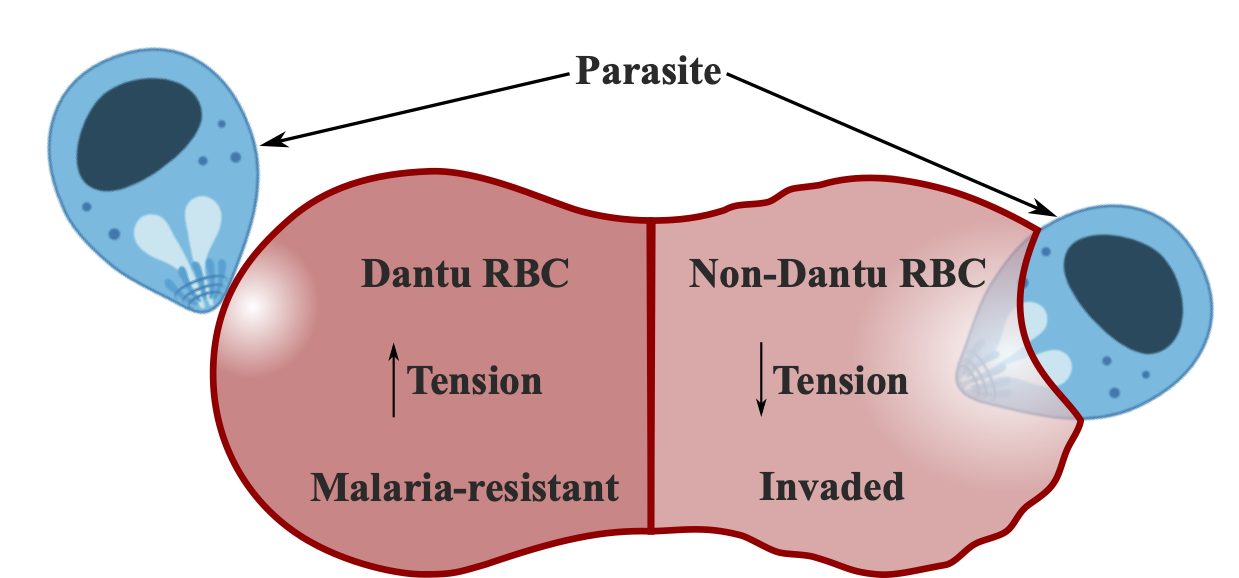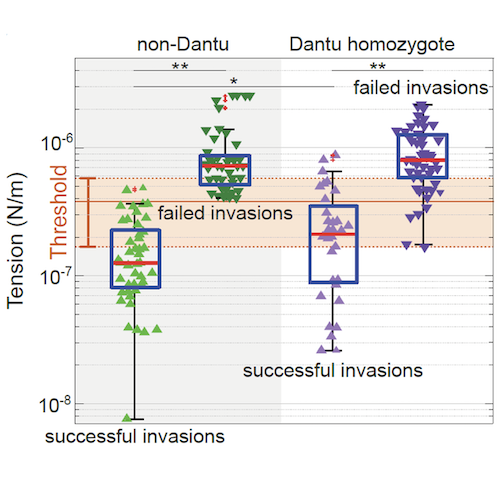
Submitted by M. Rodrigues on Thu, 01/10/2020 - 15:21
Red blood cell tension protects against severe malaria in the Dantu blood group
Scientists from the University of Cambridge, the Wellcome Sanger Institute and the KEMRI-Wellcome Trust Research Programme, Kenya have uncovered the mechanism behind the increased protection of Dantu blood type against malaria. The findings now reported in the journal Nature, will help the development of drugs that can mimic changes in red blood cell membrane tension, preventing malaria parasite infection, thereby alleviating malaria burden worldwide.
Malaria is still a devastating health problem in many countries especially in sub-Saharan Africa causing an estimated 435,000 deaths per year, with 61 per cent occurring in children under five years of age as well as hundreds of millions of cases every year.
Severe malaria is primarily caused by Plasmodium falciparum parasites and symptoms appear during the blood stage of the infection. When the Anopheles mosquito takes a blood meal from a human, anticoagulant saliva is injected together with the parasites (sporozoites), which migrate to the liver where they infect and mature in hepatocytes. Merozoites are released from the hepatocytes into the bloodstream and the intra-erythrocytic cycle begins, the phase that causes all the symptoms and pathology of malaria. Merozoites invade red blood cells within the first few minutes out of the 48h cycle and these brief minutes in the blood, when the parasite is exposed to the host immune system, represent a high priority target for vaccine and drug development, said Dr Viola Introini one of the first-authors of the paper.
Sickle haemoglobin is perhaps the most well-known protective polymorphisms against malaria but many more are now being described. One such protective variant is the Dantu blood group, which is rare across Africa, but more common in East Kenya and is characterised by a structural change in one of the surface sialoglycoproteins in red blood cells. Dantu blood group provides up to 74% protection against severe malaria in homozygous individuals, one of the highest degrees of protection reported so far and considerably greater than the most advanced malaria vaccine, but the mechanism of protection has been unknown until now.
To investigate how the Dantu blood group provides protection against malaria infection, this multidisciplinary team developed single-cell biophysical methods to investigate how physical characteristics of red blood cells affect parasite-host interactions. Prof. Pietro Cicuta, one of the senior authors explained that for the first time it was possible to record malaria parasite invasion using real-time video microscopy and simultaneously analyse red blood cell membrane fluctuations with flickering spectroscopy, thus correlating tension of red blood cells and their likelihood to be invaded. This established for the first time a threshold tension above which red blood cells are very unlikely to be invaded by malaria parasites. Membrane tension is not the same for every red blood cell in the bloodstream and the correlation between tension and invasion holds even in non-Dantu cells. Dantu blood type contains more cells with a higher average membrane tension and hence less susceptible to invasion.
Importantly, these findings provide an explanation for the protective effect of Dantu against severe malaria, but also novel insights into the physical processes taking place during parasite invasion, and how invasion efficiency varies across the heterogeneous population of red blood cells present within an individual. This has potential implications for new mechanisms of malaria control. Prof. Julian Rayner, one of the senior authors of the paper said, because Dantu has no known health implications, we are now actively exploring pharmacological ways to mimic the Dantu effect. The development of drugs capable subtly changing red blood cell membrane tension is an intriguing strategy to reduce parasite burden and could be a valuable additional weapon to control malaria.
Reference: Kariuki SN, Marin-Menendez A, Introini V, Ravenhill BJ, Lin YC, Macharia A, Makale J, Tendwa M, Nyamu W, Kotar J, Carrasquilla M, Rowe JA, Rockett K, Kwiatkowski D, Weekes MP, Cicuta P, Williams TN, Rayner JC. Red blood cell tension protects against severe malaria in the Dantu blood group. Nature. 2020 Sep 16. doi: 10.1038/s41586-020-2726-6.


